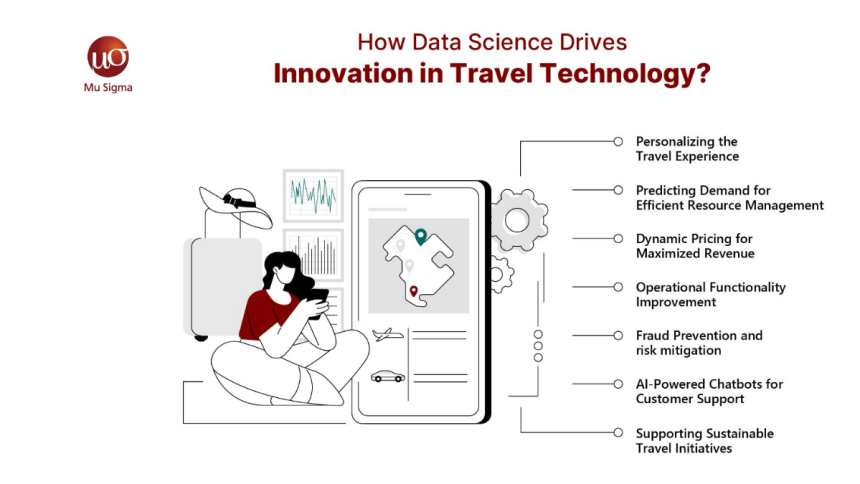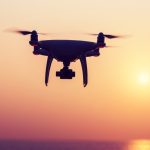The use of technology in travel has changed dramatically; it is transforming how customers plan, book, and experience their journeys. At its core lies Data science, a powerful tool that fuels innovation in travel technology. Travel companies optimize their activities to improve customer experiences and streamline processes by analyzing large datasets. This article delves into the role of data science in modern travel and provides an outlook on the growing market for innovative travel technology.
Personalizing the Travel Experience
Data science has significantly contributed to personalizing customer experiences through travel technology. Travel companies collect large amounts of data on customer preferences, behavior, and previous interactions. This data enables them to provide personalized recommendations of hotels, flights, or destinations according to each individual’s preferences.
For example, if you are searching for flights or even lodging, a booking site may be able to offer you choices that it believes you might be interested in based on your past behavior, which is time-consuming for you and them. Airlines and hotels can also target services based on customer segments and offer them unique in-flight amenities or promotions.
Predicting Demand for Efficient Resource Management
One of the foundational applications of Data Science is predictive analytics, wherein a travel organization could prepare for demand. This technology could be used as an induction compass that tracks increases and decreases in business activity registered through changes in seasonal trends as well as variations caused by local events or general economic shifts within a region.
For instance, airlines can better forecast flight schedules, adjust ticket prices, and ensure seat availability. This will depend on demand forecasting when and where demand will peak. In hotels, one can predict the occupancy rate and alter pricing to maximize revenue. This step will ensure that travel companies effectively use resources to ensure smooth running and a more fulfilling customer experience.
Dynamic Pricing for Maximized Revenue
Data Science is the key factor that has made the market of dynamic pricing in travel rise: airlines, hotels, and travel websites can reach the highest possible price in real-time demand. Firms that use algorithms supported by data science are now capable of offering cost-competitive prices that maximize their profits while adding value for customers.
For dynamic pricing, the peak holiday seasons, holidays, or large events are the best time. With dynamic pricing, travel companies can respond promptly to changing demand, maintaining competitive prices without incurring significant profit margin losses. This may be when a consumer gets a good deal by booking ahead or during off-peak periods.
Operational Functionality Improvement
Innovation in Data Science is helpful not only from the customer’s side but also improves a travel company’s internal operations. For example, airlines use data-driven insights to optimize their flight paths to cut down fuel consumption and predict maintenance needs. This helps reduce time and lower operational costs.
Similarly, airports use Data Science to reduce congestion by finding digital entrance gates instead of searching for manual ones, reducing the waiting time. Additionally, airports use AI to enhance the efficiency of luggage handling, making it more natural for passengers and speeding up the process compared to before, thereby improving the back end of travel services.
Fraud Prevention and risk mitigation
One of the major concerns for the travel industry is fraud prevention, mainly through fraudulent bookings and payment scams that could cause a loss of millions. Data science has played a major role in developing fraud detection systems using machine learning techniques to identify and flag suspicious behavior that may potentially pose a risk.
These systems will analyze transaction patterns to identify anomalies that might lead to fraudulent transactions. They will serve as a tool to prevent fraudulent transactions from ever happening in the first place. By preventing access to sensitive customer information, this preventative measure will protect companies from potential financial fraud losses while also fostering customer trust.
According to a Discover Global Network Insights report, financial institutions have experienced a 65% rise in fraud losses as businesses and criminals increasingly turn to AI and machine learning to gain the upper hand.
AI-Powered Chatbots for Customer Support
Artificial intelligence (AI), closely linked to data science, has led to the widespread use of chatbots in the travel sector. These AI-driven tools assist travelers with booking inquiries, cancellations, and general customer service queries around the clock.
By analyzing customer data, chatbots can provide personalized responses, guiding users through booking processes or resolving issues quickly. This significantly reduces the workload for human customer service teams while improving response times and enhancing customer satisfaction.
Supporting Sustainable Travel Initiatives
Sustainability is becoming increasingly important in the travel industry, and Data Science is helping businesses adopt more environmentally friendly practices. Airlines can use data analytics to optimize flight routes, reducing fuel consumption and emissions. Similarly, hotels use data to manage energy usage more efficiently, reducing their carbon footprint while offering eco-friendly services.
As travelers become more conscious of their environmental impact, data-driven solutions will continue to play a vital role in promoting sustainable travel options and minimizing the industry’s ecological footprint.
Conclusion: Shaping the Future of Travel
Data Science is undoubtedly a key driver of innovation in travel technology. From personalized travel experiences and dynamic pricing to improved operational efficiency and sustainability, its applications are reshaping the industry. As travel companies continue to harness the power of data science, we can expect even greater advancements that will enhance both the traveler experience and the efficiency of the industry as a whole.
Lynn Martelli is an editor at Readability. She received her MFA in Creative Writing from Antioch University and has worked as an editor for over 10 years. Lynn has edited a wide variety of books, including fiction, non-fiction, memoirs, and more. In her free time, Lynn enjoys reading, writing, and spending time with her family and friends.















